June 10, 2005
Barcelona and Miro
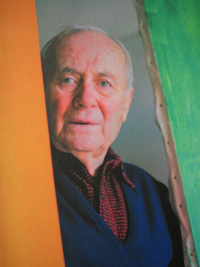
My schedule in the studio can be pretty intense, and after finishing the previous painting (thus fulfilling my commitment to the group show in Barcelona at Miguel Marcos Gallery), I figured that I have a chance to go to Barcelona and see the Miro Museum. My cousin Patricia said that she would like to come along, very good! And to top it off, we met up with my old friend Gerard Smulevich, who is teaching the study abroad program for Woodbury University's school of Architecture.
Serendipitalicious!
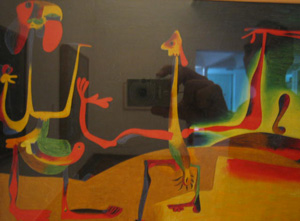
When we got our tickets, the inevitable question about photography arose. Yes, they said, no problem, just make sure you don't use flash. They must have thought: "Suckers!"... because all the paintings had glass to repel fingers (and image snatchers like me, I imagine).
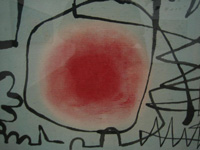
After generating the blue mists in the previous two paintings, I locked onto this kind of detail. Hmmmmmm.
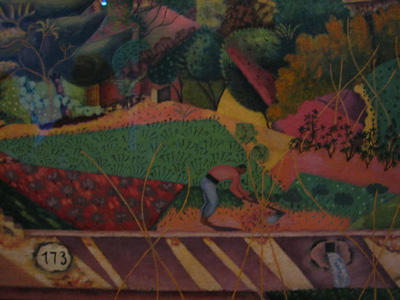
Robert Hughes wrote about Miro's "The Farm, Montroig" in his book, "Barcelona" (I want to reread it before I return to LA). Alas, this is not a detail from that painting... but perhaps it can substitute for it here:
He began to paint it in 1921, in the place itself: the family house, or casa parial, in a small village near Tarragona, south of Barcelona. He then took the unfinished picture, along with a bunch of dired grass from the farm- a fetish of contact with the Catalunya he was about to lose- to Paris. Shifting between lodgings, he lost the grass but replaced it with some from Bois de Boulogne; the picture was too advanced by then for substitution. Miro finished it in Paris in 1922 and eventually sold it to Ernest Hemmingway, who for the rest of his life revered it as his fetish of iberian memory: "It has in it," he wrote, "all that you feel about Spain when you are there and all that you feel when you are away and cannnot go there. No one has been able to paint these two opposing things."
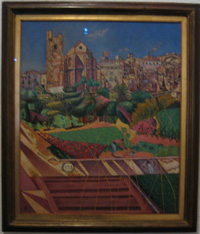
He was right; The Farm is, above all, an expatriate's painting, combining in one image the intense pressure of immediate experience if one's hmeland and an equally extreme longing for it. Everything on the farm is rendered with fidelity: the landscape in the red Tarragonese earth, is rendered with utter fidelity: the landscape is a palace of recollection, a mnemonic device itself. Miro's sense of separation and longing is conveyed by a kind of visual accountancy, an exact toting and tallying of everything that is (or was) the case on the family farm.

It could be a pictorial form of the meticulous inventory that went with peasant marraige contracts. Each tool, pitcher, keg, press, cart, watering can, donkey, dog, chicken, goat, pigeon, and donkey's rump (just visible through the door of the bestier on the ground floor ot the farmhouse) is turned to the light, delineated, listed, fixed. The sharp focus, teh hallucinated clarity of light, make the painting exquisitely frank. But they also produce the effect of looking down the wrong end of a telescope, so that the scene is remote as well...
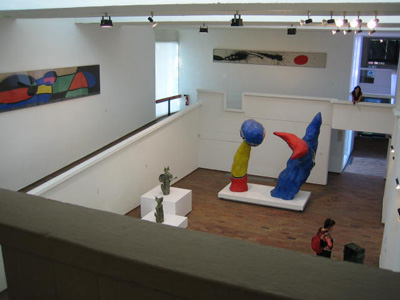
Very nice too, to see the famous Sert building. I hope no one read my post on Tapies as too flip. Like that plate of patatas bravas (see the link), Sert's architecture has (to quote myself, fingers polished on my lapel) "Earthy, particular Catalan earth, fruit of the rich soil of this region... Lavish, rich and saucy. Direct and simple, earnest and elemental."
![]()

![]()

![]()
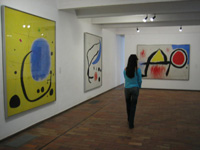
![]()
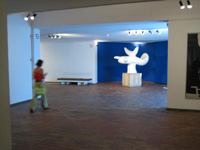
![]()
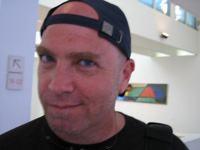
I ask Gerry for a pic and I directed him according to the Tony Cu?ha method. ?Muy bien, tio! He's been shooting a lot of pictures lately, and it flips me out since last we worked together at Woodbury, he was a freak for computers. Now, he's all reverse osmosis technology-wise. For example, check out his discovery of this crazy camera, a "Holga":
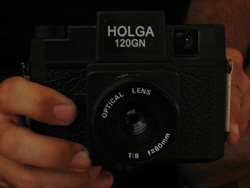
Cheap, medium format, plastic lens, easy to reengineer into other configurations. Gerry is back feeding chemical images through digital media.
Mestizo media. Mongrel technology. Very interesting. I hope to show more of his stuff in this blog later, (especially his design for portable voting stations for Muslims in Afganistan -he and Patricia had a lot to talk about there ).
Posted by Dennis at June 10, 2005 2:44 PM
Leave a comment